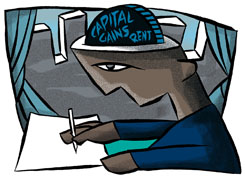Ramalingam Kalirajan |10902 Answers |Ask -Follow
Mutual Funds, Financial Planning Expert - Answered on Jul 10, 2024
He has an MBA in finance from the University of Madras and is a certified financial planner.
He is the director and chief financial planner at Holistic Investment, a Chennai-based firm that offers financial planning and wealth management advice.... more

For the last 1 1/2 years I have a tenant. Though he was regularly paying rent but he was very secretive person. He never talked much with us. Everyday he leaves the flat at 6 am and returns after 11 pm. He told us that he has a warehouse of a reputed company and for that he remains very busy. Last year he showed immense interest to buy our flat. We were also ready to sale it. He assured us that he will surely buy the property so we have not entertained any other buyer. But for the last 4 months he was behaving suspiciously. Everytime we asked him about the tentative date when he is ready to take possession, he unnecessarily avoided the question saying that his lawyer is very busy. When we contacted his lawyer, he said that he has no connection with that person for the last 4-5 months. When we crossed him, he behaved very rudely and told that he will not purchase it and from that night he has not returned in his flat. Now we want to send him an eviction notice as per our agreement as we are in urgent need of selling the property as my father is seriously ill and need to do some costly medical procedure. We do not have any duplicate key of the flat so now it is not possible also to show the flat to someone. Also he is not picking up the phone. Please help. Our agreement will end on 9th October, 2024.
Understanding Your Agreement
Firstly, review your rental agreement thoroughly. Pay special attention to clauses related to eviction, notice periods, and tenant obligations. This will guide your actions and ensure you remain within legal boundaries.
Sending an Eviction Notice
Given the tenant's behavior and your urgent need, issuing an eviction notice is the right step. Here’s how to proceed:
Draft the Notice: The eviction notice should be clear and precise. Include the following details:
Tenant’s name and address
Reason for eviction (e.g., non-payment of rent, breach of contract)
The date by which the tenant should vacate the property
Reference to the specific clauses of the agreement being violated
Signature and date
Legal Considerations: In India, a minimum notice period is usually stipulated in the rental agreement. If not specified, a 30-day notice is typically considered reasonable. However, consult with a lawyer to ensure compliance with local laws.
Serving the Notice
Personal Delivery: If possible, deliver the notice personally. Ensure you have a witness present during delivery. This could be a neighbor or a friend.
Registered Post: If personal delivery is not possible, send the notice via registered post with acknowledgment due. This ensures there is a record of delivery.
Legal Recourse
If the tenant does not vacate after the notice period, you may need to initiate legal proceedings. Here’s what you can do:
Consult a Lawyer: Engage a lawyer who specializes in rental disputes. They can guide you through the process of filing an eviction suit.
File a Case: The lawyer will help you file an eviction suit in the appropriate court. This process can take time, so it’s essential to act promptly.
Court Order: If the court rules in your favor, they will issue an eviction order. The police can then assist in evicting the tenant if necessary.
Handling the Locked Flat
Given that you don’t have a duplicate key and the tenant is unreachable, you may need to take additional steps:
Legal Permission: Before attempting to access the flat, get legal permission. Unauthorized entry can lead to legal complications.
Police Assistance: If you have a court order, the police can assist in gaining access to the flat. They can also help ensure that the process is smooth and without conflict.
Addressing Urgent Medical Needs
Since your father’s medical needs are urgent, consider alternative financial arrangements while the eviction process is underway:
Loans: Explore options for a personal loan or a medical loan. Many banks offer these with quick disbursement.
Family Support: Seek financial support from family or friends temporarily until the property is sold.
Insurance: If you have any health insurance policies, check if they cover the medical procedures required.
Future Precautions
To avoid similar situations in the future, consider these precautions:
Tenant Screening: Conduct thorough background checks on prospective tenants. Verify their employment, check references, and ensure their credibility.
Clear Agreements: Ensure your rental agreements are clear and legally sound. Include clauses for regular inspections and maintenance visits.
Duplicate Keys: Always keep a duplicate key for the flat. This ensures you have access if the tenant becomes uncooperative.
Genuine Compliments and Empathy
Your proactive approach to solving this issue is commendable. It’s not easy to handle such stressful situations, especially with urgent medical needs. Your concern for your father’s health shows your dedication and love.
Final Insights
Handling a difficult tenant requires patience and legal guidance. Issue an eviction notice, consult a lawyer, and follow legal procedures to regain possession of your flat. Simultaneously, explore financial options for your father’s medical needs. Being proactive and seeking professional help will ensure a smoother resolution.
Best Regards,
K. Ramalingam, MBA, CFP
Chief Financial Planner
www.holisticinvestment.in
You may like to see similar questions and answers below
Ramalingam Kalirajan |10902 Answers |Ask -Follow
Mutual Funds, Financial Planning Expert - Answered on Jul 25, 2024
T S Khurana |538 Answers |Ask -Follow
Tax Expert - Answered on Sep 28, 2024
Ramalingam Kalirajan |10902 Answers |Ask -Follow
Mutual Funds, Financial Planning Expert - Answered on Aug 02, 2025
Radheshyam Zanwar |6750 Answers |Ask -Follow
MHT-CET, IIT-JEE, NEET-UG Expert - Answered on Dec 19, 2025
Samraat Jadhav |2514 Answers |Ask -Follow
Stock Market Expert - Answered on Dec 18, 2025
Reetika Sharma |432 Answers |Ask -Follow
Financial Planner, MF and Insurance Expert - Answered on Dec 18, 2025
Reetika Sharma |432 Answers |Ask -Follow
Financial Planner, MF and Insurance Expert - Answered on Dec 18, 2025
Reetika Sharma |432 Answers |Ask -Follow
Financial Planner, MF and Insurance Expert - Answered on Dec 18, 2025
Samraat Jadhav |2514 Answers |Ask -Follow
Stock Market Expert - Answered on Dec 18, 2025

Kanchan Rai |648 Answers |Ask -Follow
Relationships Expert, Mind Coach - Answered on Dec 18, 2025
Kanchan Rai |648 Answers |Ask -Follow
Relationships Expert, Mind Coach - Answered on Dec 18, 2025
Anu Krishna |1754 Answers |Ask -Follow
Relationships Expert, Mind Coach - Answered on Dec 18, 2025
Anu Krishna |1754 Answers |Ask -Follow
Relationships Expert, Mind Coach - Answered on Dec 18, 2025


























